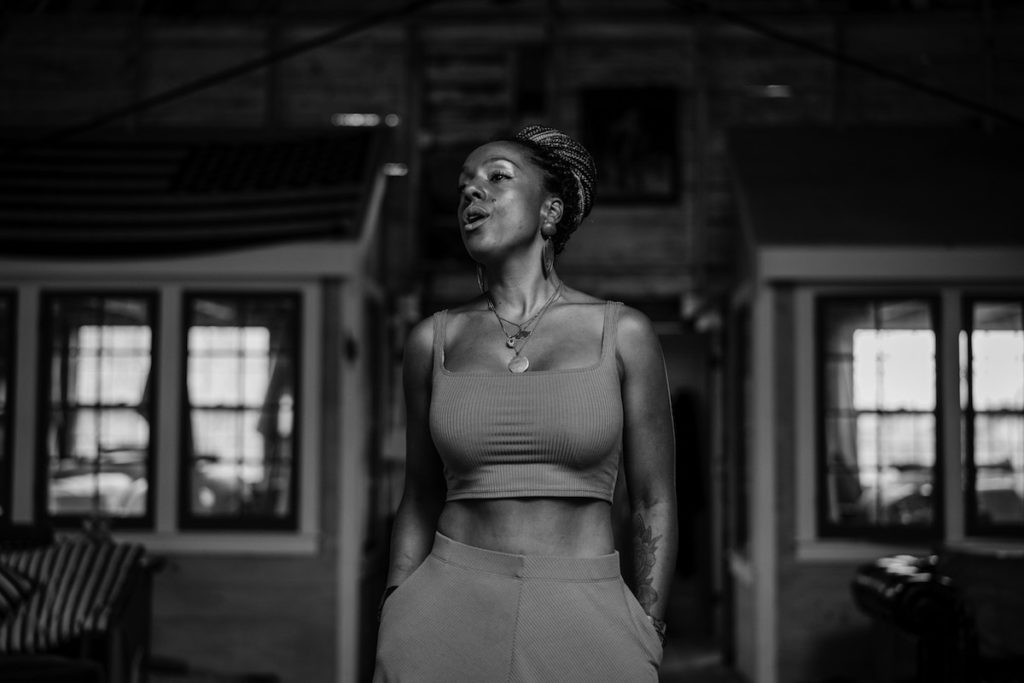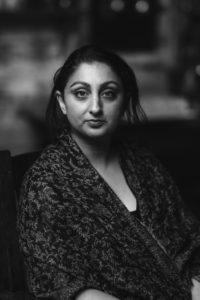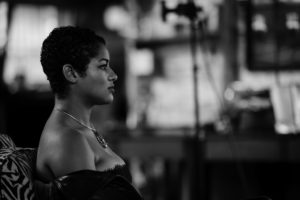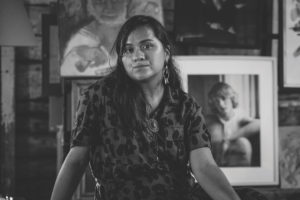Join Wellfleet Preservation Hall on Wednesday, Aug. 4, 7 p.m. for a screening of two short films by local filmmaker Michael Cestaro: White Space and Clay. The screening will be accompanied by live music by singer Mozelle, one of the subjects of White Space. Clay is a disarming and poetic profile of ceramicist Steve Kemp. Tickets are $20 at wellfleetpreservationhall.org.
White Space Michael Cestaro
HERSTORIES
Coloring In the White Space
Four women of color recall growing up on Cape Cod

PROVINCETOWN — Michael Cestaro’s short film White Space will screen on Sunday, Jan. 17 at 3 p.m. on Zoom. In it, four women of color — Mozelle Andrulot, Alejandra Cuadra, Tianna Esperanza, and Muska Yousuf — who spent their formative years on largely white Cape Cod discuss their lives and experiences and perform in the historic Hawthorne Barn in Provincetown.
“People say racism doesn’t exist here,” said Cestaro, who lives in Eastham. “I was shocked by that. To me, it meant the people of color on the Cape weren’t being seen.”
In interviews this week with the Independent, each of the women talked about her life here. Excerpts from those conversations follow.
Mozelle Andrulot was born in Key West, Fla. but grew up in Eastham, where her mother returned after a marital split-up. Mozelle was three years old. Now a resident of Orleans with a business in Wellfleet, she is well known throughout the Cape as a talented singer.
“My mom was white, and my dad was black. When I was three days old, we got evicted because the landlord found out my dad was black, and my mom had a baby. The excuse was that it was a two-bedroom apartment and there were three of us. He said we couldn’t even be on the grass, so everything we owned was on the sidewalk, when I was three days old. So that’s kind of how it all started.
“My mom always talked about writing a book called Where’d You Get That Black Baby? because one time she was nursing me and somebody yelled out from a big Ford, ‘Where’d you get that black baby? Why are you nursing that black baby?’
“When I was three, my mom and I left Key West and were in Buford, N.C. at a stop light. My mom had a little red Toyota, and she told me to get down to where my feet go, because at the light were guys in K.K.K. hoods passing out pamphlets. I remember her being so anxious and praying for the light to turn green. It turned green and we went through. It is one of the first memories I had. I think it was the intensity of the moment.
“Growing up here, I remember it being very old and very white. I grew up in a white family. My mom remarried, and I have a brother and a sister. I was one of eight black kids in my high school. I was the only black kid at Eastham Elementary during my time there, and I don’t think I realized those things until my friend Isaac came in the fourth grade. He was a black boy. It was like ‘Oh, my God, what is this feeling right now?’ Not to say it never really registered with me, but it wasn’t a constant thing on my mind until I saw someone like me.
“My mother always spoke up for me. I remember a parent-teacher conference and the teacher was so confused, looking at my mom and looking at me. My mother didn’t get angry. She just said it one time: ‘This is my daughter, Mozelle. I’m Francine, her mother.’ She was just very matter-of-fact.
“I have five babies. Their dad’s white. I took my older boys to see Black Panther, and Zion, who is very fair, took my hand during the movie and said to me, ‘I wish I was just as black on the outside as I am on the inside.’
“They have it so much better than I did, with the influx of Jamaican people moving here, and people moving from all over, it’s been such a wonderful growing of a black community down here. It’s so great. My kids will never be the only mixed kids in the school. They don’t have to look around and feel like ‘I’m the only one in here and it’s Martin Luther King Day and people are being weird to me.’ ”

Muska Yousuf’s family came to Cape Cod from Afghanistan when she was two years old. She grew up in Eastham, where she attended schools in the Nauset Regional district.
“I didn’t notice a lot of overt racism until high school. There was a group of guys we referred to as the ramp guys, because they ate their lunch hanging out by the handicap ramp. They would cause havoc on a lot of people — not just minorities — but when I walked by, there would be racial slurs. I would be called a ‘sand N-word.’ I became so anxious every time I would have to walk by that I would go out of my way to avoid it, even if it meant walking all the way around the school to get to my classroom.
“I was a senior in high school when 9/11 happened. I was one of two Middle Eastern people and the only one of Afghan descent. I remember pulling into the school and the car directly next to my car had ‘Kill the Afghans’ written on the back.
“It was very difficult sitting in class. I remember one student saying, ‘We’re just going to bomb the bleep out of Afghanistan.’ I don’t know whether he knew I still had family in Afghanistan, but he knew I was from Afghanistan.
“I had a few teachers who reached out to me to ask if I was okay, but I felt very lonely at that time. I went to the principal, along with one other student who was Iranian, and asked if we could have an assembly so the students would have awareness of what was going on. Nothing ever happened. The kind of silence I got from the higher administration was troubling.
“After law school, I decided I wanted to open my practice on the Cape. Coming back after so many years, I was very alarmed by how things were happening, again with places of power not doing anything. Last summer I lived in Yarmouth. There was a noose that was hung up and white supremacist flyers put up, and I didn’t feel the Yarmouth Police Dept. gave the appropriate attention to that. It was kind of written off as either young kids goofing around or out-of-towners.
“In Falmouth, a man had a K.K.K. flier put in his mailbox. Recently, the head of a black doll left on someone’s lawn that had ‘N-word lover’ written on it. These things blew my mind.
“I was very personally invested in the Barnstable County Commission race, where this man who was openly racist and sexist was in a high position of power. I got involved in getting a recall provision in the charter.
“There was also an incident at a Barnstable Assembly of Delegates meeting, when another woman of color and I tried to expose systemic racism within county government. We were kicked out of the meeting in a dramatic way. The chairwoman of the Assembly of Delegates told us we were troublemakers, and we weren’t allowed to talk about it, especially if we were mentioning a sitting member.
“There are tons of different people of color and organizations out there that are exhausted because there are maybe one or two or three people working on something. Finding those people and saying ‘I will help’ is what you have to do. It meant a lot to me that so many people showed up for the next Assembly of Delegates meeting after I got kicked out and spoke of how they felt about what happened. I got teary eyed. That was a moment where I didn’t feel alone anymore.”

Biracial singer-songwriter Tianna Esperanza grew up on the Cape, graduating from Barnstable High School in 2017. She now lives in Wellfleet.
“There’s this duality of being defined by race, but also being tokenized for my race here on Cape Cod because of how predominantly white it is. I try to find spaces that have nothing to do with race. Even though I talk about race quite a bit in my music, I also talk about love, sexuality, and many different things. I hope to create a space in white people’s minds that takes up more than just race, a space beyond my skin tone, you know, and that values me for the many different aspects of who I am and the many different aspects of my music.
“I will say that I have experienced, quite a bit, white people on the Cape who have been open and nondiscriminatory. But on the other side, I experienced emboldened hatred in broad daylight, when a man yelled at me, ‘fucking, stupid N-word’ when I was at a stop light.
“I think it’s time we delve a little deeper on this MLK Day about everything that’s going on. It’s okay to talk about community, but I’m thinking globally. Because of this pandemic, because of Black Lives Matter rallies across our nation and people standing in solidarity with us across the world, I think that thinking globally is appropriate.
“I often feel tokenized when it comes to this day. I have been asked to do many different events, and I’m grateful for that. I’m happy to do it, and I still will continue to do it, but I think sometimes I do feel like I’m the token black girl of the Cape. I was just 17 when I was in Provincetown talking about race to people three times my age, who really have the power to change things and haven’t for so long, so, of course, there are many feelings of isolation.
“I think, after this year, with the terrible, tragic event of George Floyd being murdered, there has been a lot more awareness spread throughout the world, as well as on Cape Cod. I’ve started witnessing more and more hate and more and more acceptance from many sides.
“So much has changed for me. Even cutting my hair, I wear a hat because I’m afraid that I look like a black male now driving a car. I don’t like driving at night. When I get pulled over for a taillight, or whatever, I’m more fearful. A cop may be pulling me over for a valid reason, but we have been bombarded with horrible videos and images of black people dying left and right at the hands of cops and white nationalists or supremacists.
“I know a lot of other people have moved through the world experiencing this all their lives. Now I’m experiencing a little bit of it, and it’s really horrific. If a cop pulls me over, especially a white cop, to put it simply, is he a good one or a bad one? And if he’s a bad guy, how far will he go?”
Alejandra Cuadra is an immigrant from Peru who grew up on Cape Cod. She is now an artist, living in Medford.

“I am composed of two cultural identities. My roots lie in Peru, while I have branched out within the United States. I was raised by strong, fierce, independent women. When I was eight, my mom decided to pack our bags, leave our family, friends, and home behind to come to the United States with hopes of a better life. Throughout my upbringing, I saw the sacrifices she made to get to the place where we stand.
“As an immigrant growing up, I would have this conversation in my head, about when do I give myself the authority to speak up and how much. I think it came from not wanting to stick out.
“I felt safe in a lot of ways, but at the same time there was fear of saying something or acting in a different way. I knew I couldn’t have a car in high school, but I didn’t want to explain why. That was the big notion with my immigrant status, so it became like ‘I’m just going to quiet myself and be by myself.’
“I also go back to the experience of my mother growing up in Peru. There were issues of classism and sexism and race, and there still are. I think, as an immigrant, you feel so privileged and so lucky to be here, you feel like ‘I don’t want to say anything, because what if my privileges are taken away?’
“Art became my safe space. I was fortunate enough to have gone to Nauset High School, and I took a clay class with Amy Kandall. She is amazing and I love her. I realized there are spaces for you to be who you are as you come. Give me a piece of clay and give me that freedom. I realized I didn’t have to be alone.
“I think, for me, growing up and changing a lot was going to college. I went from Cape Cod, where I had these safe spaces where I felt I belonged, to art school in Portland, Maine. My second year, I became part of the Students of Color Coalition, again connecting to experiences where people are allowed to come as they are, with their own stories, and they can speak their own truths, their own happiness, and their own frustration.
“I became involved with the Indigo Arts Alliance, which is an organization that focuses on promoting and nurturing artists of color from all over the world. When I was interning there, the artist in residence was Sarah Khan, who said ‘You belong everywhere.’ I still remember that little mantra.
“My sister is 12 years old, and she is fierce. I love her. We had this conversation because some people had told her to go back to where she belongs. She said, ‘I grew up here. I belong here.’ I think, for the next generation, I’m inspired by them in many ways. They see things in a different way. Kids are really smart. I think they get it.”
The screening of White Space and the question-and-answer session to follow it are free and open to the public. To view the film on Sunday, log onto upabovecreative.com/whitespace at 3 p.m.
